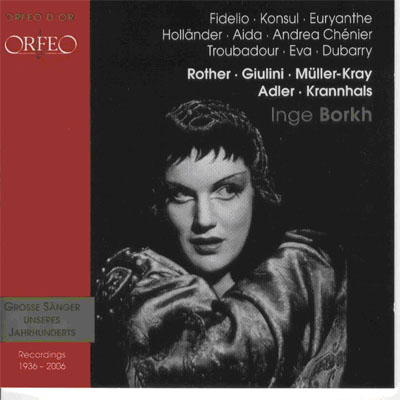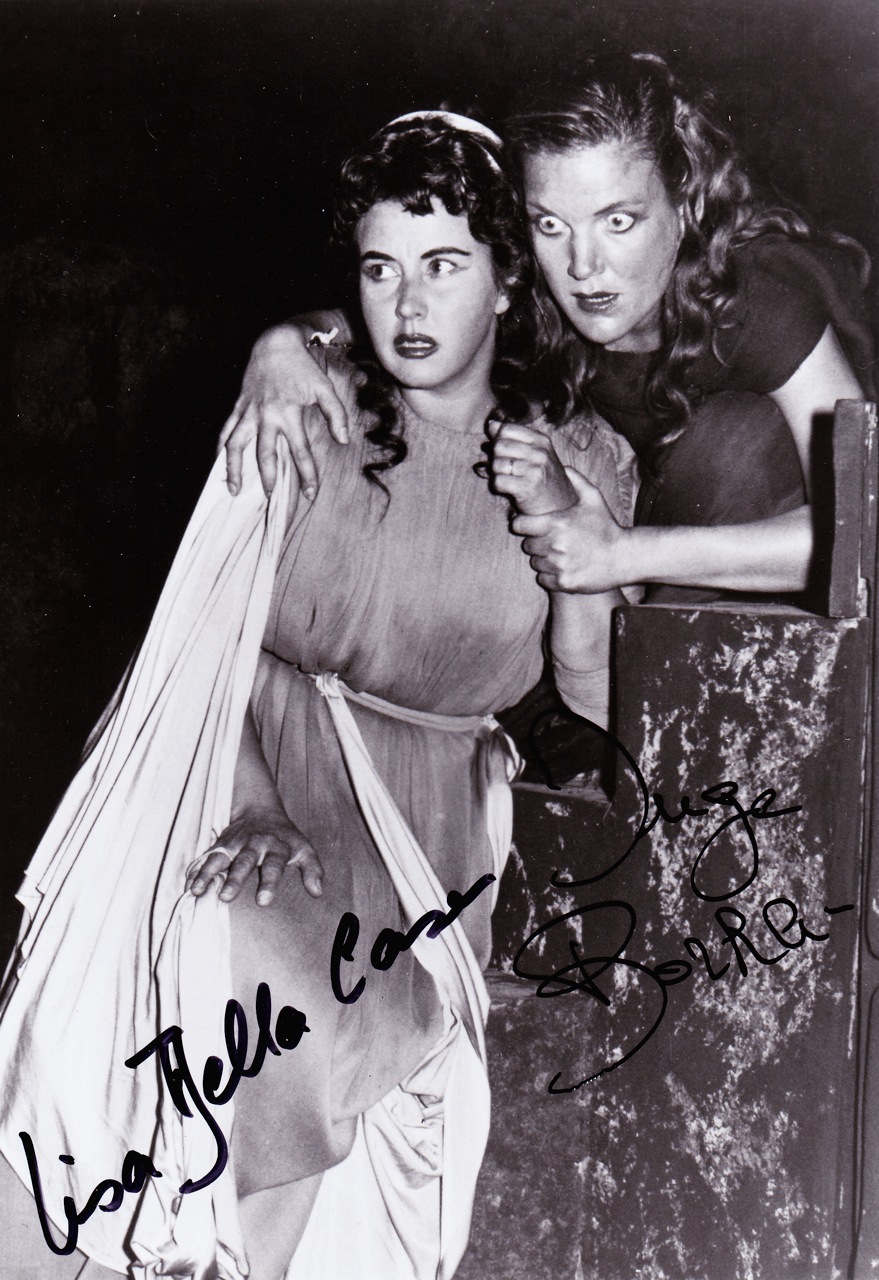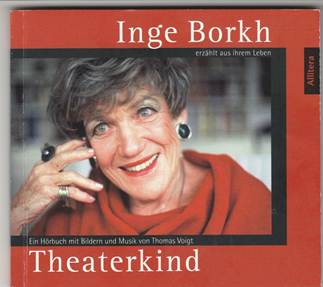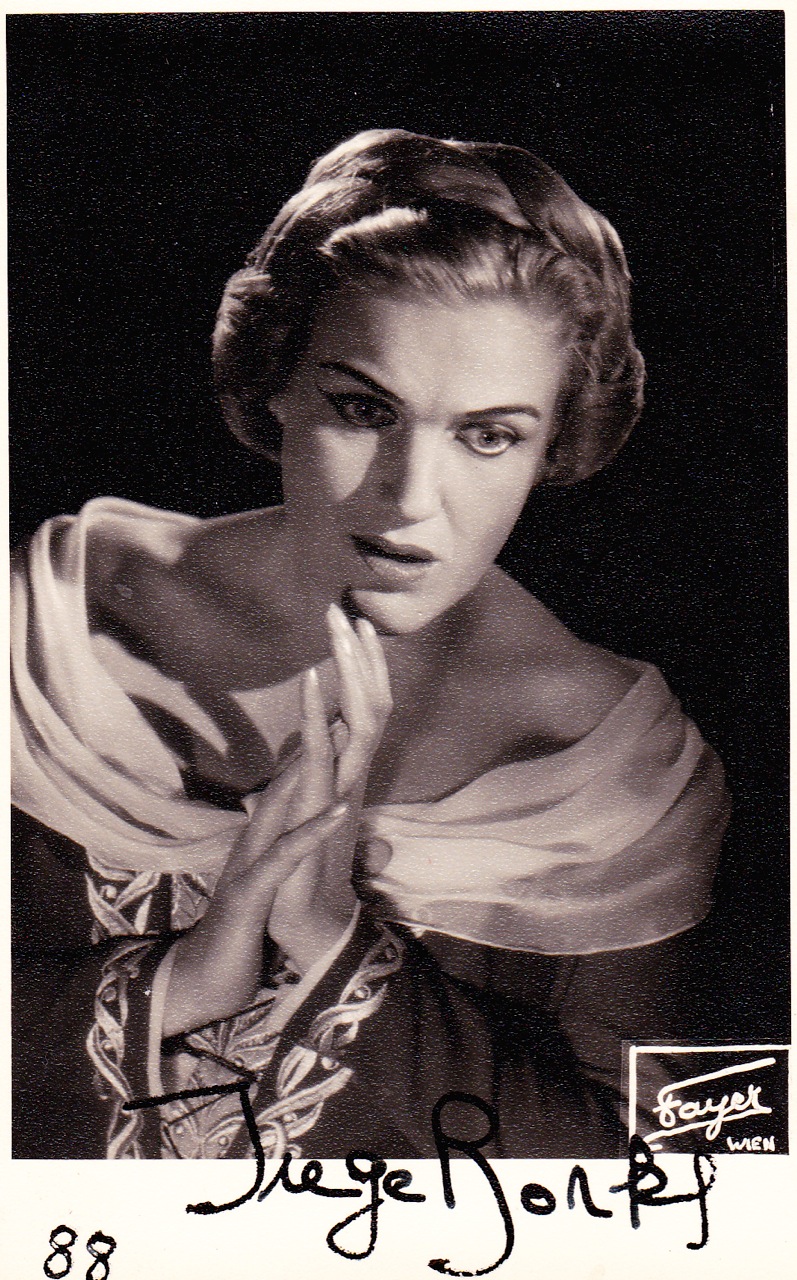
 (with Della Casa, courtesy Charles Mintzer)
(with Della Casa, courtesy Charles Mintzer)
 (with Della Casa, courtesy Charles Mintzer)
(with Della Casa, courtesy Charles Mintzer)
Inge Borkh
CD Orfeo d’Or C714061B
This reviewer has always had a weak spot for this fine German-Swiss soprano. Unlike most “German” sopranos she possessed a lyric warmth not often associated with the German Fach and which also blessed singers such as Frieda Leider and Lotte Lehman. As a young kid I learned my first Turandot through her Decca recording and I still have an undiminished enthusiasm for it in spite of some deficiencies, for Inge Borkh is still the least ‘icy’-sounding princess in recorded Turandot history. Thus when last week I saw this new Orfeo release I immediately grabbed it. Especially as the CD portrait offers several new items of great interest. This record was released to mark the 85th birthday of the legendary singing actress and it features recordings from a spam of seventy years, extending from her earliest private recordings of 1936(!) to rarities from the fifties and finally to an interview conducted in 2006 by Thomas Voigt former editor of a German opera magazine. Voigt is also the co-author of a second book on the singer published two months ago and rightly entitled “Nicht nur Salome und Elektra”. A title which speaks for itself because sadly enough Borkh is too often associated with Strauss alone while the soprano had a much more varied repertory in which she excelled. Proof of which is this CD. Her legendary recording of Magda Sorel’s harrowing act two scene “Mein Kind ist tot” out of Menotti’s Consul going back to 1951 still moves and impresses and surely equals the legendary status of Eileen Farrel’s ‘My child is dead’ from the same opera. Like on Borkh’s Gala disc the Orfeo label also situates this scene in the third act. Both should have known better. This scene by the way has been preserved on record by several sopranos as well Patricia Neway (creator’s record), Joyce Castle, Michigan-born Susan B. Anthony, Susan Bullock, Virginia Zeani (live) who performed the piece in Italian and by Greet Koeman who sang it in Dutch (!) under Eduard Flipse.
Borkh’s Euryanthe scene from the Maggio Musicale in 1954 under Giulini is another tour-de-force : a free upper register with a constantly steady delivery and a pure vocal line.
Her Italianate renditions of Aida and Trovatore even when sung in German makes one regret not more of her is available in this repertory. Borkh also recorded highlights from Verdi’s Un Ballo in German.
Borkh initially wanted to become a stage actress and thus it is no wonder her enunciation is always so well-rendered with every word perfectly clear.
Practically a lost art with present day German-speaking sopranos. In the Aida scenes (1953) she’s partnered by her late husband Alexander Welitsch (1906-1991 ) and Bulgarian tenor Christo Bajew (1922-1983). Probably the only available recording of the tenor. Borkh also recorded arias from Macbeth, Forza, Chenier, Cavalleria and Adriana now released on the Austrian Preiser label.
In the interview (in German) she raves about her 1954 recording of the final duet of Andrea Chenier with Richard Tucker. Indeed both are in stupendous form with voices which blend wonderfully well. Furthermore I also firmly believe this is Tucker’s most stylish and sensitively sung finale of the opera ever.
The earliest recordings go back to the end of the thirties with two operetta renderings from Millocker’s Dubarry and Léhar’s Eva. Oh, how I wish she had devoted more time to this repertoire as with her intelligence, vocal warmth and musicality she could have placed several others whom I will not name in the shade. Even as a young girl she impresses with her enthusiasm when at age 14 she recorded a Ralph Erwin song. Ralph Erwin an indirect Nazi victim (1943) and of Richard Tauber fame (Ich kuesse ihre hand Madame) would have loved her unspoilt go at ‘Man hat’s nicht leicht’.
Other selections include a fascinating Fidelio and excerpts from the Flying Dutchman. I remember from a now almost legendary interview session on a German late night television show which featured not only Inge Borkh but also Martha Eggerth and Anneliese Rothenberger that Borkh was a most interesting person who had many fascinating things to tell therefore I sort of regretted the limited space given to the interview on the CD because she’s also a joy to hear her speak.
For those who want to discover Borkh’s art compilations besides the Preiser label are also available on the Gala label. Get them; you won’t be disappointed.
Rudi van den Bulck, Opera Nostalgia
INGE BORKH
THEATERKIND, EIN HORBUCH MIT BILDERN UND MUSIK VON THOMAS VOIGT
CD ISBN 978-3-86906-159-7

Inge Borkh is an artist I like very much as can be judged from my CD review above. I am also taken by her personality and the way she can talk about her life and career. So when this audiobook (in German) appeared I didn’t hesitate to purchase it. Thomas Voigt was responsible for the questions.
Regrettably these aren’t always insightful and often he does not go into depth leaving the listener with even more questions behind. The war years –Borkh is ‘half jewish’ -are a case in point. Also for years I have wondered what exactly happened between her and Rodzinski in the Carmen incident. A role she was engaged to sing with him in Italy but at the first rehearsal she left.
The redeeming factors are still Borkh’s traightforwardness and the accompanying booklet with 87 pages of (many previously unpublished) photos. The interview is illustrated with several soundbites but these contain nothing new if you possess the previously released CD of Frau Borkh.
